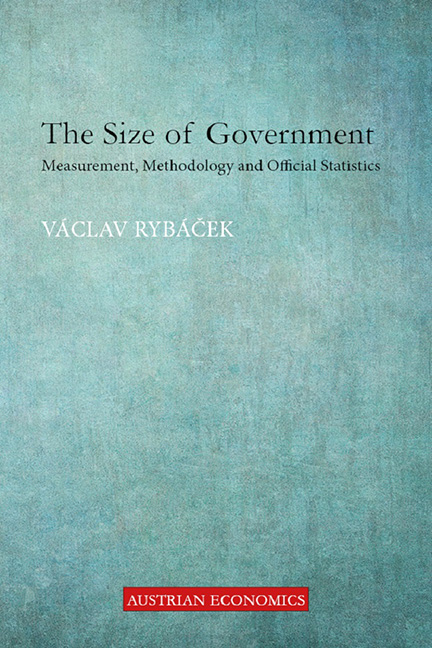Book contents
- Frontmatter
- Contents
- Introduction
- Chapter 1 The Size of Government in Economics
- Chapter 2 The Role of Measuring Government in Economic Policy
- Chapter 3 A Short Trip to the Past
- Chapter 4 The Current Approach
- Chapter 5 What’s Wrong with the Current Approach?
- Chapter 6 The Size of Government and GDP
- Chapter 7 Is the Size of Government Underestimated?
- Chapter 8 Recalculation of the Size of Government
- Conclusion
- Notes
- Bibliography
- Index
Chapter 2 - The Role of Measuring Government in Economic Policy
Published online by Cambridge University Press: 09 August 2023
- Frontmatter
- Contents
- Introduction
- Chapter 1 The Size of Government in Economics
- Chapter 2 The Role of Measuring Government in Economic Policy
- Chapter 3 A Short Trip to the Past
- Chapter 4 The Current Approach
- Chapter 5 What’s Wrong with the Current Approach?
- Chapter 6 The Size of Government and GDP
- Chapter 7 Is the Size of Government Underestimated?
- Chapter 8 Recalculation of the Size of Government
- Conclusion
- Notes
- Bibliography
- Index
Summary
As discussed in the previous chapter, macroaggregates provide guidance for many economic decisions of individuals and institutions. At least for this reason, we should take them seriously. In this chapter, we shall look at their use in economic policy. Discussing the influence of macroaggregates on economic policy is not only reasonable because the performance of economic policy is the main driving force of the demand for macroeconomic figures, but also because of the potential for economic-policy institutions guided by potentially ill-defined macroaggregates to negatively impact on society at large.
Politicians routinely use aggregates when arguing for the success of their economic policy or the failure of their opponents, as well as to emphasize a need for implementation of further measures should an “economic disaster” be avoided. Some have such faith in figures as the former French president Hollande who promised not to seek re-election in 2017 if unemployment continued to rise. That same year, newly elected president of the United States Donald Trump promised to return to 4 per cent annual growth. Figures simply matter.
Similarly, government deficit and debt figures have had significant political impact in many European countries where they have gained a prominent position chiefly in connection with the political project of European Monetary Union (EMU). Due to the interlinking between fiscal and monetary conditions, an inherent tendency of governments to run deficits and to amount debts may pose a problem especially for the functioning of the EMU. To enforce fiscal discipline and to avoid a collapse of the eurozone, which is based on the fiat currency, the EU bureaucracy developed a comprehensive and highly complicated statistical system known as Excessive Deficit Procedure (EDP). In addition, they put these figures at the centre of fiscal management.
MACROAGGREGATES AND THE EUROPEAN UNION
Why is this EDP “monitoring system” required? The main reason is a concern that unsound government finance can prevent the central bank from delivering price stability. If any member of the monetary area runs an unsustainable level of debt, than bailout could be necessary.
- Type
- Chapter
- Information
- The Size of GovernmentMeasurement, Methodology and Official Statistics, pp. 27 - 46Publisher: Agenda PublishingPrint publication year: 2019



